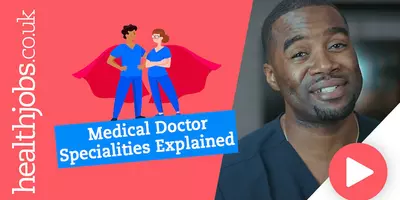 How to become a doctor
How to become a doctor11 Oct 2017 ● Dr Zak Uddin, Doctor (MB ChB, MRCS, DRCOG, MRCGP)
How to become a doctor
Zak Uddin explains how and why he became a Doctor, and just how tough the job really is.
The path into medicine is incredibly varied, and the traditional perception of doctors being young white males from middle class backgrounds with a private school education, has long disappeared.
Presently, you can enter medicine either straight out of sixth form, or as a mature student. Individuals don’t necessarily need three science A-levels, as courses now accept candidates who have a proven track record outside of health-related studies and professions, as long they are able to demonstrate both the aptitude as well as a good understanding of what life as a doctor entails and requires.
With more applicants from increasingly diverse backgrounds, and the percentage of women in medicine steadily rising, we now know that it is much more than good grades alone that are needed for what is not just a job, but also a lifelong journey of education as well as practice.
When did you decide on a career in medicine?
As a child, my father was a hospital consultant, and my aunt had just qualified and was rotating through junior doctor jobs, so I had a great deal of exposure to medicine, both good and bad aspects.
I can remember thinking how polished my dad was, at a time when hospital consultants still wore suits on ward rounds, and were treated like minor celebrities within their circles.
Equally I haven’t forgotten the look of exhaustion on my aunt’s face as she came off another full weekend on call, where she was in the hospital from Friday morning until Monday.I made the decision to apply for medical school after two weeks of shadowing in a local hospital, following my GCSE exams.
I was lucky to have been supervised by a variety of doctors from juniors through to consultants, who all seemed to be enthusiastic about the profession, and were more than happy to allow me a brief glimpse into their day.
I tailored my A-levels so that I had the prerequisites of Chemistry and one other science subject. At the same time, I selected English Literature as my third choice, as it strongly appealed to my creative instinct.
What does a medical degree entail?
I attended the University of Manchester, when it had the reputation of being the first medical school in the United Kingdom to offer Problem Based Learning (PBL). Although developed in Canada in the sixties, and implemented in other universities across the world thereafter, this form of teaching was late to be taken up in the UK.
It is based on presenting a scenario to a small group of students, who themselves identify gaps in their collective knowledge, and devise a set of learning objectives to be met before the second session. At this point, the team discuss their understanding with the idea of benefitting from shared interaction in a situation small enough, every participant has a chance to join in.
PBL has been taken up by medical schools across the British Isles and across the world, and in some centres is used on its own whilst in others, alongside traditional lecture based teaching. It has derivatives including Case Based Learning (CBL) and Enquiry Based Learning (EBL).
There are still some medical schools that employ the traditional system of two or three years of formal lectures, known as pre-clinical studies, followed by three years of supervised hospital exposure.
But more institutions are moving towards patient contact early on, some within the first few weeks of the course.
The pre-clinical years cover the basic sciences of anatomy and physiology, biochemistry, histology, pharmacology and medical ethics. As mentioned above, this is organised through a combination of didactic lectures and laboratory exposure, with varying amounts of work in small groups if you have chosen to attend a PBL, CBL or EBL course.Following successful completion of this period, the clinical years allow you to be allocated a base hospital, which is usually a large teaching hospital in the vicinity of the medical school.
Here you rotate through attachments in medicine, surgery and related disciplines, with the aim of learning and improving your skills in history taking and physical examination of patients.
This opportunity also allows practice of basic skills such as venepuncture and ECG interpretation, as well as a first taste of life as a “proper doctor”. You will rotate through a selection of specialties, both in hospital medicine as well as primary care, and in a selection of hospitals, from large tertiary care “super hospitals” where there are facilities for cardiac, neurosurgery and perhaps event transplantation, to the district general setting.
However, the level of care is more dependent on the healthcare professionals as opposed to the status of these facilities, and you may be pleasantly surprised by the number of opportunities to learn in smaller environments where medical students almost function in the role of a newly qualified doctor.
An elective, undertaken in the final year of study, presents you with the chance to experience a specialty that you feel you may wish to take up after qualification.
At the same time, the possibility of travel may give you an insight into alternate healthcare systems; Australia, which is very close to the set up in the UK, or the third world, where the lack of basic medical supplies can really open your eyes to the hardships some people endure on a daily basis.
What qualifications do you need?
There are three main routes into medical school. The first is following Chemistry and another science A-level. Having attained high enough grades, you will be eligible for all standard 5 year courses. You would also be suitable for those which are six years long, where the extra year is spent attaining a Batchelor of Science Degree.
If you have high enough A-level grades, but not in the necessary subjects, there is the opportunity to apply for courses where a pre-med year is offered. In this time, you will cover chemistry, biology and physics to a depth required for the study of undergraduate medicine.
As a mature student, if you are already in possession of a health sciences degree, the fast track course, is a dedicated four-year course, which compresses the same material as a five-year degree into a shorter time space, largely by the omission of long summer holidays.
Naturally, people with the adequate grades in Scottish Highers or the International Baccalaureate are also eligible, as are foreign students who meet the criteria, and often wonderfully enrich what is already a varied cohort of medical students.In addition to these requirements, UK Medical Schools now have their own entrance exams.
These are the UKCAT, BMAT and GAMSAT. The latter is for graduate entry medical courses only.
To be completely sure that you are eligible for a specific university, it is worth first visiting the medical school page of their website or prospectus. If you are still unclear, then a telephone call to the admissions office should hopefully clarify the situation.
Where can you study to become a Doctor?
According to the Medical Schools Council, there are now 33 medical schools in the United Kingdom, which collectively hope to offer an additional 1,500 places to study medicine by 2018.
Where you choose to study medicine will be based on a number of considerations:
• What type of course you feel would best suit you (lecture based versus PBL),
• Where you are in your career (previous health sciences degrees may make you eligible for a fast track four-year course, whereas if you have good A-level grades, but not in the appropriate subjects, you will be required to do a preliminary year),
• Your home situation (if you are married with children, it will be a big strain if you select a medical school far away from your family).When considering a medical school, visit the school itself, the campus and the city. You will most likely end up practicing, at least initially, in the area where you qualified, so if you feel you would be happy in this place for at least the next five years, apply for this medical school.
If you can't wait to get away, it is highly unlikely you will feel settled there.
What can you expect from a job in medicine?
Although medicine is incredibly broad, the initial foundations are fairly generic.
Having qualified from a recognised medical school (all medical schools in the UK are accredited by the General Medical School, but some foreign schools may not be), you will then embark on Foundation Training, which is two years of four monthly rotations in medicine, surgery and general practice.
For those interested in academia, opportunities are opening up for dedicated exposure to this as well as other specialities not previously offered at this stage, for example public health and pathology.
By the end of your foundation years, it is hoped that you will have decided on your chosen career pathway, be this in primary or secondary care.
It is worth thinking about this when you make your foundation year choices, as exposure to a specialty will either confirm your desire to pursue it at a higher level, or help you decide that its perhaps not for you.
The level of stress in your job is largely decided by which specialty you choose, your own personality, and your ability to cope under pressure.There are very different types of stress within medicine. For the thrill seekers, a career in surgery with its perceived glamour and excitement, may seem very appealing.
Yet be aware, it takes several years to get through gruelling training, there is incredibly fierce competition for a small number of posts, and ultimately, one wrong move in the operating theatre could result in catastrophe.
At the same time, a position in public health, with no direct patient contact, and the requirement to analyse lots of data, may seem boring. But the decisions you make, and the advice you give, have the potential to affect hundreds, if not thousands of patients. If you get it wrong, this could be worse than one slip of the knife.
Your choice of specialty should be based upon the feeling that this is something you'd be capable of, as well as happy to do for the rest of your career. If you survive on the comfort of knowing everything about a small field, then a single organ specialty, for example respiratory medicine, may be suitable.
If repetition bores you, perhaps General Practice, where you really do not know what will come through the door next, may be a better pathway.
The choice of specialty is arguably as important as your decision to choose medicine as a career. Being in a field that you don’t like, or you feel is beyond your capabilities, will adversely affect all aspects of your life, both inside and outside of the job.
Equally, if you start in one area and realise it's not for you, there is no shame in admitting this and changing to another. This requires good insight and self-awareness, and is better decided sooner rather than later.
What makes a good doctor?
The General Medical Council lists a number of qualities such as humility, empathy, the ability to deal with uncertainty, and a commitment to lifelong education.
I believe this can be made much simpler and requires you to ask yourself, “Is the sacrifice worth the reward?”
By sacrifice, I mean the financial burden of a course that may leave you with up to £70,000 in student loans.
Are you willing to move away from your family and friends to study in a place where you may well end up staying for the rest of your career?
Can you deal with working nights and weekends, when others will be relaxing in a comfortable bed, or indulging their hobbies and past times?
Do you have the dedication required to spend at least five years after qualification sitting exams before you become an independent specialist?
Can you perform under pressure and keep calm when all around seems to be going wrong and emotions are high?
If the answer to these questions is yes, and you have a thirst for the subject itself, then exploring a career in medicine is certainly worthwhile.
However, if your desire is an easy life, or you don’t enjoy or even struggle with face-to-face interaction, a career in clinical medicine is unlikely to bring you the happiness you are seeking.
Equally, although medicine is well remunerated compared to other professions in the healthcare system, if your primary goal is the acquisition of financial wealth, it is likely that becoming a doctor will leave you disappointed.
Hard and soft skills
• Hard Skills
A high level of understanding of the three sciences,
Appropriate dexterity to carry out basic procedures eg. Taking blood,
Understanding symptoms, and how they're put together to assist in decision making, ordering of investigations, and formalising a diagnosis.
• Soft skills
Genuine interest in the working of the human body,
Desire to understand how illness affects the individual, and those around them,
Compassion for someone who is suffering,
Ability to stay calm under pressure,Stamina and determination to keep going for long periods of time,
Recognition that medicine is forever changing, and the ability to alter your practice to reflect current practice,
The willingness to see a problem through to resolution, and recognising when to ask for help,
Ability to work independently as well as within a team,Ability to achieve good work life balance.
What career opportunities are available?
Perhaps the greatest benefit of having a degree in medicine is the almost limitless number of options it provides following qualification. With over fifty specialties, there really is something for everyone.
From surgery, to providing holistic care in general practice and palliative medicine, there is probably no other career that provides you with such choice.
Although it is normal to have no idea of what you want to do following qualification at the time you apply for medical school (I certainly didn’t), it is hoped that by the end of your undergraduate studies, you will have some thoughts as to what you would like to pursue.
Medicine travels incredibly well, and there are numerous opportunities to work abroad, at a junior as well as senior level, both paid, as well as volunteering.
Clinicians are often able to combine two closely related specialties, for example anaesthesia and intensive care medicine, which allows variety in the working week and is almost akin to having two separate jobs.
For those interested in furthering their specialty, there are opportunities to marry a clinical position with research work. Similarly, if your passion is teaching, getting involved in this at an early stage after qualification will demonstrate your commitment and allow you to access more senior positions, at both undergraduate and postgraduate levels.
Some doctors are interested in the media aspects and helping the general public get to grips with all the information out there. For a select few, this can become a very lucrative side line.
Although a medical degree is very well respected in its own right, and some individuals decide after their undergraduate studies to pursue a career which is completely unrelated, I would advise anybody who already feels like this beforehand to consider alternate subjects.
The duration of study, financial expenditure, as well as the rigour of the profession are not to be underestimated, and it is likely that you will not complete the course.
Sometimes a basic science course beforehand may be more suitable, as you will still end up with a very respectable degree, and the three years of study will hopefully concrete your feelings, one way or another.
Medicine is an excellent career, well respected, with a defined structure for progression, and definite financial prospects. However if this is all you want, there are numerous other jobs that will provide you with these benefits, sometimes for less effort.
To do medicine and be happy, you need a genuine lust for the subject material, an inquisitive nature, the desire for lifelong learning, yet be a team player, show humility, respect patients and colleagues alike, and most importantly, recognise where your limits lie and when to ask for help.
I cannot imagine any other profession that would have exposed me to all the things I have seen, and has had such a defining role in shaping me as a person.
Equally, I acknowledge that it is not for everyone, and the decision to become a doctor is ultimately a very personal one.
Browse our list of Doctor Jobs here.


